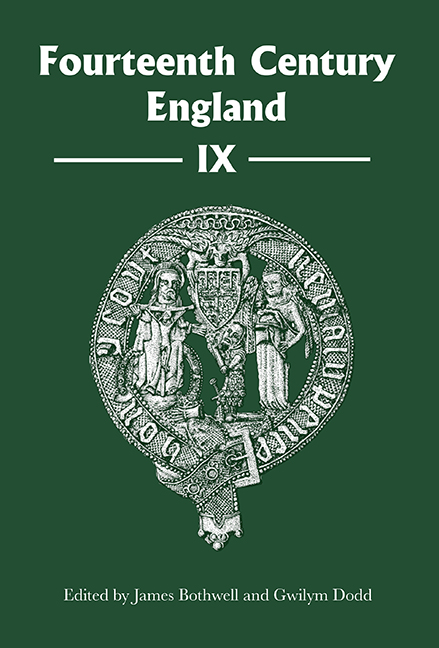Book contents
- Frontmatter
- Contents
- List of Illustrations
- Contributors
- Preface
- Abbreviations
- The Death of Edward II Revisited
- Living in the Shadows: John of Eltham, Earl of Cornwall (1316–36)
- Careers of the Lesser Parochial Clergy Before the Black Death
- Heritage and Symbolism: the Romans and Tanners in Fourteenth-Century York
- ‘Let Them Realize What God Can Do’: Chivalry in the St Albans Chronicle
- Historical Writing in the North-West Midlands and the Chester Annals of 1385–88
- High-Status Execution in Fourteenth-Century Ireland
- Traitor to the Chose Publique: Negotiating Constitutional Conflict Through the Law of Treason 1399–1402
- Notes and Documents – A Letter from Chatton: the Date and the Writer
- Fourteenth Century England Issn 1471–3020
Notes and Documents – A Letter from Chatton: the Date and the Writer
Published online by Cambridge University Press: 07 May 2022
- Frontmatter
- Contents
- List of Illustrations
- Contributors
- Preface
- Abbreviations
- The Death of Edward II Revisited
- Living in the Shadows: John of Eltham, Earl of Cornwall (1316–36)
- Careers of the Lesser Parochial Clergy Before the Black Death
- Heritage and Symbolism: the Romans and Tanners in Fourteenth-Century York
- ‘Let Them Realize What God Can Do’: Chivalry in the St Albans Chronicle
- Historical Writing in the North-West Midlands and the Chester Annals of 1385–88
- High-Status Execution in Fourteenth-Century Ireland
- Traitor to the Chose Publique: Negotiating Constitutional Conflict Through the Law of Treason 1399–1402
- Notes and Documents – A Letter from Chatton: the Date and the Writer
- Fourteenth Century England Issn 1471–3020
Summary
Much scholarly attention has been given to what proved to be the last months of the reign of Richard II and the process of political regrouping that resulted in his deposition. The continuing debate as to how best we may interpret that process has rightly dwelt on questions of date and viewpoint of what we take to be relevant evidence, and the need for and value of attention to such basic premises of historical method might seem to require no further emphasis. Such considerations may nonetheless be salutary, whatever the interpretative possibilities and evidential point prove to be. I therefore venture the following comments on the date and provenance of a letter that has elicited occasional mention on the margin of such discussion.
The letter survives in the National Archives (Public Record Office) among the miscellanea of the Chancery, with the current call-number C47/22/11/10 (previously Tower Miscellaneous Rolls no. 459). It was calendared by Joseph Bain in the Calendar of Documents relating to Scotland, IV (Edinburgh, 1888), 106–07 thus: ‘no. 506, a letter from the Duke of [Albemarle?] to the king, dated 14 July [1398]’. Until recently, this has been followed by later students of the period. But in the additional fifth volume of that Calendar, edited by G. E. Simpson and J. D. Galbraith and published by the Scottish Record Office in 1986, a corrigendum is entered (p. 111) thus: ‘no. 506: for [1398], July 14, read [1399], July 11’. Subsequently, several scholars have adopted this revised dating. Finding this odd, I looked at the original – and transcribed it as below. It had suffered some damage by the time Bain read it, but fortunately not to the text of the letter or to its dating clause. Having examined it, and verified that Bain's reading of 14 July is correct, I cannot understand what might have seemed to justify the asserted reading of 11 July. As to the year of writing, not stated in the document, the only sound method on which to base an ascription is to be guided by what the document itself does state – and that is what Joseph Bain duly did.
- Type
- Chapter
- Information
- Fourteenth Century England IX , pp. 169 - 176Publisher: Boydell & BrewerPrint publication year: 2016

